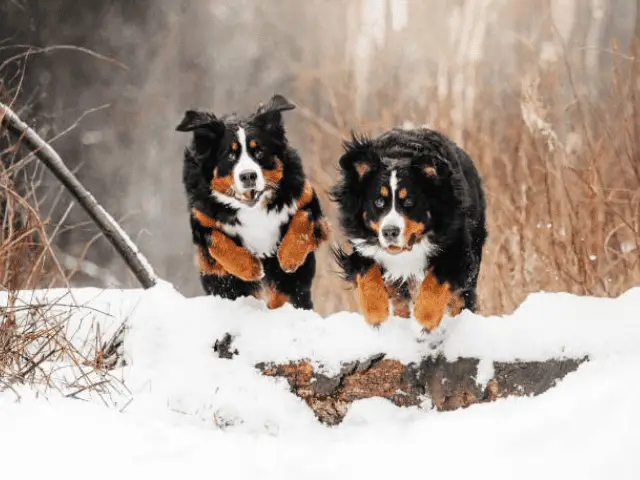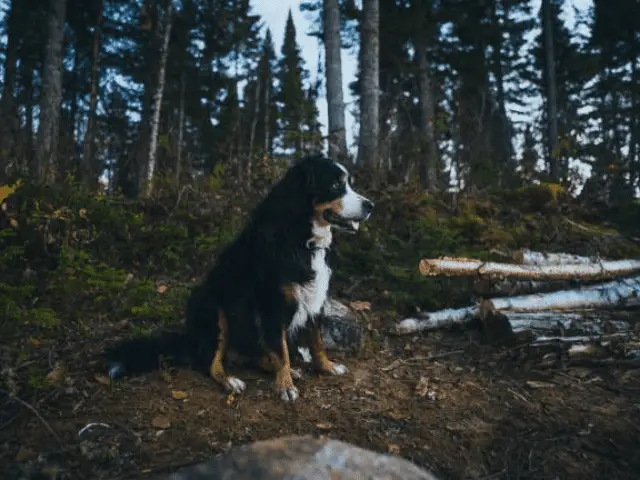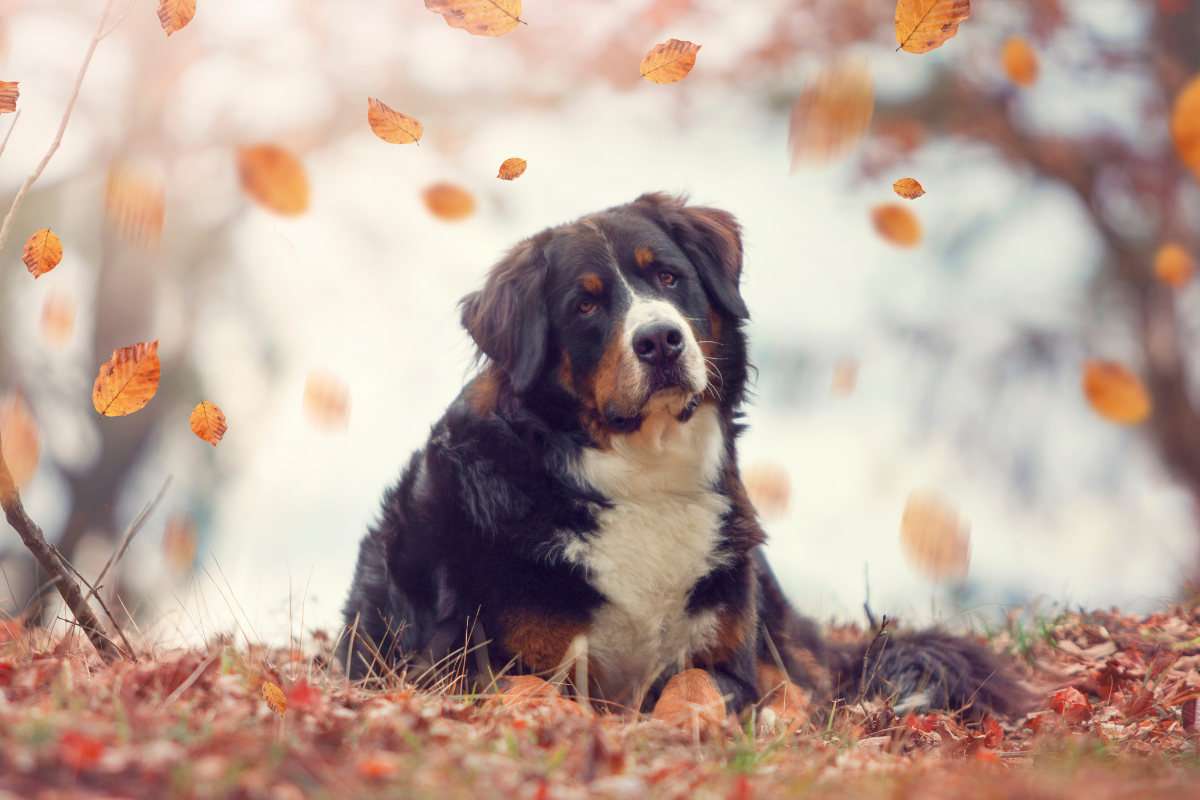Spending time outdoors has been proven to improve mental health and overall well-being and adding a canine companion to your travels is a great way to make hiking even more fun.
Just like people, dogs enjoy a variety of different activities and for hikers considering bringing a canine companion along for the adventure, it’s important to understand the breed and the best conditions for each individual dog.
Bernese Mountain Dogs (sometimes referred to as a Berner for short) are strong, loyal, affectionate dogs that make great hiking companions for leisure hikers and long-distance trekkers that love spending their time exploring on the trail.
(sometimes referred to as a Berner for short) are strong, loyal, affectionate dogs that make great hiking companions for leisure hikers and long-distance trekkers that love spending their time exploring on the trail.
Understanding the breed, their health considerations, and what types of activities they excel at will create an ideal lifelong hiking buddy.
This article contains affiliate links. If you make a purchase through one I may earn a commission.
Health Consideration for Bernese Mountain Dogs

Although Bernese Mountain Dogs are a relatively healthy breed with an average lifespan of 12-16 years, they are prone to a few inherited conditions that may make hiking more challenging or impossible if undiagnosed or left untreated.
Bone & Joint Diseases
Bernese Mountain Dogs are prone to developing bone and joint issues known as elbow or hip dysplasia . In affected dogs, irregular growth of the ball and socket joint causes the femur and the adjoining socket of the pelvis to grow at disproportionate rates, resulting in laxity of the joint leading to degenerative joint disease or osteoarthritis
. In affected dogs, irregular growth of the ball and socket joint causes the femur and the adjoining socket of the pelvis to grow at disproportionate rates, resulting in laxity of the joint leading to degenerative joint disease or osteoarthritis .
.
While appropriate breeding habits and health testing can rule out this condition in some dogs, it’s important to have a thorough veterinary exam before starting hiking and to stop if your dog displays any symptoms of pain during hiking such as limping, lethargy, or being slow or unable to rise after periods of activity.
For Bernese Mountain Dog puppy owners, feeding a balanced diet for each stage of life, adding joint support supplements, delaying spay or neuter procedures, and avoiding strenuous exercise during adolescence can further decrease the odds of elbow or hip dysplasia later in life.
Slow and Steady Wins the Race with Bernese Mountain Dogs

Although this playful, friendly breed is quick to make friends with other hikers and dogs alike, their large size and relatively muscular frame are not well-suited for trail running or other activities that require high stamina.
Although their imposing body type is not ideal for running, Bernese Mountain Dogs have high endurance when it comes to physical activity and can enjoy hiking or backpacking at a leisurely pace for long distances.
When hiking long distances, it’s important for owners to be prepared with plenty of supplies for their pup like adequate amounts of water, travel bowls, a collar with easy to read identification tags, a leash and harness, and training aids.
Bernese Mountain Dogs are Highly Intelligent
Mental stimulation is just as important as physical exercise when it comes to hiking with a Bernese Mountain Dog.
Bernese Mountain Dogs are less mischievous than some breeds and their eager to please personality makes them highly trainable hiking buddies. This breed enjoys activities that get them thinking such as nosework tracking, herding, and obedience training which can easily be incorporated into a hike.
For young Bernese Mountain Dogs or new rescue dogs, hiking is the perfect opportunity to work on leash manners and obedience while exposing them to a number of new and exciting stimuli to provide them with adequate socialization. Well-trained Berners would benefit from being let off leash to practice recall obedience along a wooded trail or to perfect their endurance on more advanced terrain.
Bernese Mountain Dogs are Great Off Leash
Originally bred as working farm dogs, Bernese Mountain Dogs are trustworthy and eager to please, making them great off leash hiking partners.
Although each dog is different, most Berners do very well when let off leash during a hike as they instinctively tend to stay close to their owners with minimal training due to their natural herding instincts and affectionate personality.
Before making the decision to hike with an off leash dog, owners should consider their pet’s personality and training level, trail rules and guidelines, and hiking conditions including daylight time, weather, and familiarity with their surroundings. It is not recommended for puppies, newly adopted dogs, dogs with medical conditions, or untrained pets to be off leash unsupervised.
Bernese Mountain Dogs Love Cold Weather

Originally from Switzerland, Bernese Mountain Dogs are no strangers to cold weather and actually prefer spending time playing in the snow. They make great hiking companions for cold weather hiking due to their long, double coat which consists of a soft undercoat with a thicker outer coat that provides important temperature regulation in all types of weather.
which consists of a soft undercoat with a thicker outer coat that provides important temperature regulation in all types of weather.
In the winter, the undercoat serves as natural insulation to keep pets warm, but in cases of more severe weather, owners should practice cold weather animal safety techniques. When hiking in cold weather, it’s important to stay away from icy terrain, invest in canine hiking gear like snow boots and properly fitted winter coats, and ensure your dog is healthy before setting off on an adventure.
When on the trail, owners should monitor their Bernese Mountain Dog for signs of hypothermia and be prepared for emergency situations with supplies like extra water, dry blankets, medications, and emergency contacts.
and be prepared for emergency situations with supplies like extra water, dry blankets, medications, and emergency contacts.
In warmer climates, the double coat keeps pets insulated by holding air close to the body to help Bernese Mountain Dogs stay cool in hot climates. Proper grooming techniques to keep the hair from getting matted will allow the double coat to function properly for temperature regulation and shaving should be avoided.
Additionally, Berner owners should follow warm weather pet safety techniques allowing plenty of rest on hot days, offering water frequently, and staying in shaded areas along the trail. A good rule of thumb when hiking in warm weather is if it’s too hot for you, it’s too hot for your dog and they should be left at home.
Swimming is Not a Berner Specialty
Although Bernese Mountain Dogs love outdoor activities, swimming is not necessarily one of their specialties. These gentle giants are large, muscular dogs that possess a great deal of strength, but their cumbersome body type makes swimming difficult.
While Bernese Mountain Dogs may enjoy wading in the water to cool off after a hike, this breed is not ideal for hikers that enjoy incorporating water activities into their hikes.
Camping with Bernese Mountain Dogs

Bernese Mountain Dogs make excellent companions for hikers setting out for multi-day excursions or camping retreats. Due to their affectionate nature and high adaptability, Berners tend to stay close to their owners and have a fairly easy time adjusting to new situations and environments.
Although friendly and welcoming to most other dogs and hikers, Bernese Mountain Dogs are very in tune with their surroundings, making them great alert dogs to keep themselves and their owners safe if any wildlife or unwanted intruders approach the campsite.
High Elevation Hiking with Berners
Like all humans and other mammals, dogs can be prone to altitude sickness at elevations greater than 8,000 feet. and attempting a high-elevation hike with your Bernese Mountain Dog before they are properly trained and acclimated may result in a serious, life threatening medical condition.
at elevations greater than 8,000 feet. and attempting a high-elevation hike with your Bernese Mountain Dog before they are properly trained and acclimated may result in a serious, life threatening medical condition.
Elevation hikers should consult with their veterinarian before attempting high elevation hikes with their Bernese Mountain Dog and ensure they know the risks of high altitude hiking for themselves and their pets before hitting the trail.
for themselves and their pets before hitting the trail.
Symptoms of altitude sickness in pets include labored breathing, nausea/vomiting, excessive panting, pale gums, increased heart rate, and collapse. Berner owners should always bring plenty of water for their pets when hiking high elevations as higher altitudes can quickly cause pets to become dehydrated.
With proper training techniques, Bernese Mountain Dogs can make an ideal trail partner for solo hikers that enjoy an active lifestyle and long hikes. Berners are affectionate, highly intelligent dogs that can keep their owners safe and happy while building memories on the trail that will last a lifetime.

